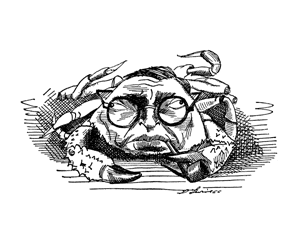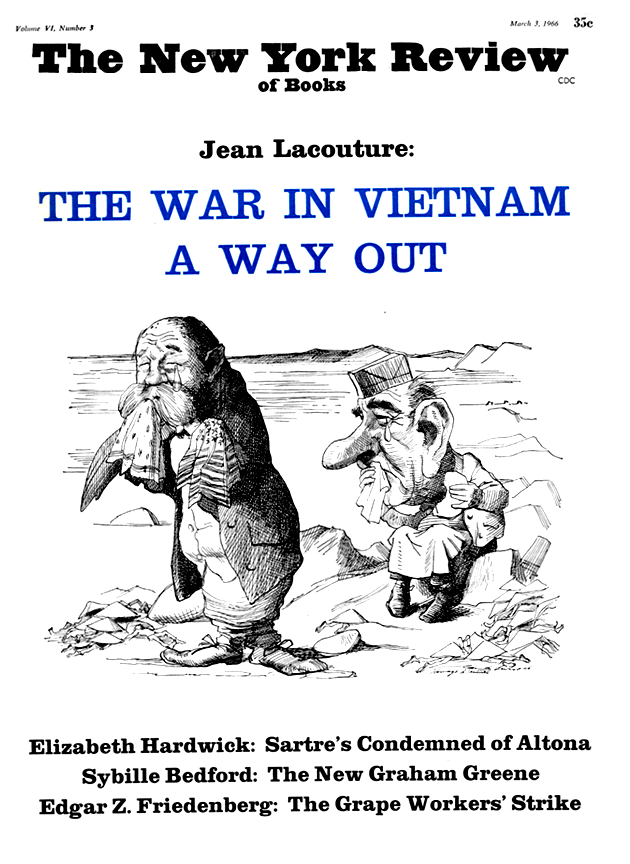“The century would have been good if man had not been tracked down by his relentless, immemorial enemy, by the carnivorous species that had set out to slay him, by that hairless, sly beast, man himself.” In fragments like this one from the final scene of Sartre’s The Condemned of Altona, we see why the play was chosen as a part of the political and historical season at the Repertory Theater. The play, about German guilt, was meant, when it was produced in Paris in 1959, to take the audience beyond Germany to the French guilt for atrocities in the Algerian War. We, here in New York in 1966, are in the midst of a war defined by bestial atrocities on both sides; hideous documents will one day, if the war is ever over, present themselves for our contemplation, for our moral judgment on the victims and the victors, for our atonement perhaps. In the interval at the play, I heard the title called “the condemned of Altoona,” and I wondered if we could ask ourselves to make the leap from Germany to Algeria to ourselves. The play is difficult and it seems unlikely that we were truly confronted. This failure does not lie altogether at the door of the production, although it was not imaginative. Sartre’s play is poorly constructed and it takes several slow readings of the text to uncover the brilliant ideas entombed in an awkward plot.
The Condemned of Altona is really two plays. One is an engrossing monologue about war and guilt and the other is an indifferent bourgeois drama of German family life. “The Blood of the Walsungs” and a bit of the Liebestod are mixed with the horrors of the last war. The Gerlach family has survived the war and are living in their house in Altona, near Hamburg. The family, under the general amnesty and prosperity, is rebuilding its shipping firm; the father is dying of cancer. They take the family name seriously; they speak of themselves and define themselves as if they were an institution. All in all they are simply a necessity of plot and cannot engage Sartre’s real talent for dramatic argument and abstract conflict. “We may lose our principle but we keep our habits. Bismarck was still alive when our poor father acquired his,” they say. Of “The Bible. We always put it on the table for a family council.” The council has been called so that the elder, dying Gerlach can exact a promise from his son, Werner, to continue to live in the family house and to guard the family business. Werner’s wife, Johanna, wants to free her husband and herself. The members of the family explain their positions; each has his role, but they are not very life-like, nor even particularly interesting. They are a frame for the other play.
THE REAL play has to do with the other son, Frantz, who returned from the Russian front thirteen years before the action of the play, locked himself in his room at that time and has since been doing a sort of penance for German guilt, his own guilt, and that of his country. He is “sequestered”—the word in the French title carries the suggestion of aloneness, removal, a confiscation of one’s own spiritual means. It is less dramatic than “condemned,” although Frantz is also condemned, or damned. As we are first made to understand it, the family is hiding Frantz because of some trouble in which he assaulted an American soldier who was trying to rape his sister. Gradually we learn that the truth is more serious and there are indeed urgent reasons for Frantz’s removal from society. Frantz is hiding from himself, hiding from his guilt and because of his guilt. He hides and yet he wishes to record his horror by means of his hysterical monologues into his tape recorder. “We are betrayed by our acts,” he says. “By our words, our filthy lives.”
In his youth Frantz had seen his father sell off some of the Gerlach land for use as a concentration camp. He had tried to save a poor rabbi, but his father had intervened, let the rabbi go to his death, and to avoid trouble sent the son off to the German army. Frantz’s early instinct of respect for life had been violated by his father; his father is guilty of having shown the son that indeed life is not necessarily sacred and that one does not always honor even the most elemental rights of others. In the army we learn that Frantz had allowed some captured partisans to be shot; it is this we believe he is trying to understand in his hiding place; trying to understand and to find some commensurate expression of guilty recognition. But in the final act, we discover the truth, the truth of a crime greater than murder: Frantz has been a torturer, a torturer of live human beings. Except for his father’s bribery of some of the German soldiers who had witnessed the torture, Frantz would have stood trial as a war criminal. He is then in hiding for his own life.
Advertisement
THE FRANTZ play is opaque, but extremely interesting. It is revealed to us in backward and forward intrusions. The sudden flashbacks are not always sufficiently dramatized for us to get the full plot significance, or the significance as argument, of each new turn. Details are masked in a sort of blur of intensity and this curious play is both over-written and under-developed, both verbose and fragmentary. In any case, Frantz is in his room above the family living quarters; he stalks about, eating oysters and drinking champagne, making a tape recording for the “thirtieth century.” “If there’s a man alive then, he will be in a museum.”
Frantz has been kept from the knowledge of German recovery by his sister, Leni, an hysterical “Iseult” type, with whom he sleeps, but “not very often.” This mistake about present-day Germany provides Sartre with some sweet ironies: Frantz weeps for the starving orphans, the dead cities. And yet one is not quite sure what Sartre means us to think: Would starving German orphans, in 1959, satisfy any moral design? On the other hand, Frantz’s unwillingness to forget stirs us deeply. He will not give up the drama of his guilt, even though he will not quite face its truth, either.
Johanna, Werner’s wife, wishes to seduce Frantz out of his imprisonment in order to free them all from his domination. He is literally over them, day and night, holding them prisoner also by his presence, and he is morally hanging over them, as a criminal who may yet be brought to justice. Only by his removal, indeed by his death, can they get on with “recovery.” For Frantz, forgetfulness and recovery are an intolerable amnesty he struggles against. “What would become of me without a tribunal?” By that he seems to mean that without judgment of his behavior, his own judgment or that of the world, he cannot truly be a human being.
To believe that Germany has remained a wasteland, a destroyed and dead place, is a justification to Frantz for his own destructiveness, a balancing of crimes. What cannot be borne is that one should act vilely and yet it should all count for nothing. Frantz and his rantings—full of contradictions and avoidances and yet, again, personal courage—are the whole meaning and excitement of the work. He is an odd conception, part Wozzeck perhaps. and part Brecht. And very “German.” I have heard that the performance in Paris was extraordinarily moving, that is, the performance in the role of Frantz. The same, of course, is not the case with Tom Rosqui in the part: His is, instead, a dutiful struggle with a treacherous challenge.
THE THEMES of revolutionary guilt that are in Danton’s Death and in Sartre’s play have not been vividly projected by the company at Lincoln Center. But perhaps there is more at hand than the failure of casting and theatrical craft. Perhaps we are not sufficiently experienced in what these plays are about and for that reason our understanding of them is a bit cold and remote. It is usually agreed that our best successes on the stage, both in writing and certainly in acting, are dramas of individual neurotic tensions, rather special and private tensions at that. Pretentiousness and hollowness dog the tracks of those who seek a greater historical and social engagement.
The drama of dominations and powers cannot be played out without suffering; intensity is not enough. I sometimes, during the performance of the Sartre play, thought of Major Claude Eatherly, the “Hiroshima pilot,” and the fact that Eatherly’s case, his “guilt,” are open to the most impressive doubts made his image all the more compelling. It was a fraudulent, a not quite serious guilt we were being shown.
Still, history, our century—“a rummage sale,” Sartre calls it—seems to be leading us to a true meeting with guilt, leading us to suffering, to acquaintance with the sorrows and mysteries and miseries to which hubris and power have led other modern nations. As it is now, the Lincoln Center Repertory can only in a pale innocence struggle with its revolutionary themes. It is something like Napoleon sending his troops to a little island, only to have them surprisingly melt away. It appears that we do not—neither director nor actor, neither audience nor critic—understand what is happening here in “Altoona” nor what happened some decades ago in Altona.
Advertisement
This Issue
March 3, 1966



